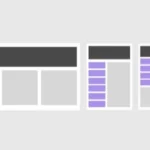
What is alignment in web design?
March 26, 2024
Different ways to use columns in web design
May 10, 2024How to approach a web design interview?

Preparing for a web design interview? It's crucial to plan your approach carefully.
It's not just about showing off your technical skills but also about displaying your creativity, problem-solving abilities, and teamwork. As you prepare for your interview, it's crucial to plan your approach carefully to make a strong impression on potential employers. In this blog post, we'll discover how you can present yourself as the perfect fit for your dream web design role.
1. Show Your Portfolio
When presenting your portfolio, choose projects that match the employer's interests and demonstrate your abilities well. During the interview, talk about the goals, challenges, and results of each project, and explain your role in solving problems and coming up with new ideas. Website design is a visual profession, so make sure to have a good portfolio that shows your skills and hard work.
2. Discuss UX/UI Design
Present thought process behind your UX/UI designs, explain how you implement user-centric approach. Additionally provide some example on how you are staying updated on design trends, how well you collaborate in teams, and offer a case study that shows your problem-solving abilities.
3. Focus on Responsive Design
By today's standard, RWB is a must. Make sure to highlight your experience in optimizing the websites to work well on any device, prove your skills with responsive frameworks and testing methods. Show your dedication to delivering smooth user experience across different platforms, and don't forget to present your ability to adapt to the mobile-first approaches.

4. Know Your Basics
Although convenient, modern content management systems platforms may be tempting to fully rely on, it's extremely important for web designers not to overlook the importance of mastering fundamental languages like HTML, CSS, and JavaScript. Each of these is a backbone of web development, helping designers with more technical problem solving and overcome limitations of pre-built platforms.
5. Understand SEO Principles
Besides understanding basics of SEO, explain how you make websites easy for search engines to find by improving site structure, speed, and mobile compatibility. Talk about how you make images and content accessible and organized, showing how your designs help websites rank better, target relevant keywords, and bring meaningful potential traffic.
6. Don't Forget About Soft Skills
Besides your technical skills, make sure to talk about your soft skills like communication, problem-solving, and teamwork, which are really important in this industry. Support your statements by telling stories about how you've worked well with clients and teammates, solved problems, and managed projects efficiently.
To ace a web design interview you will need a well-thought-out plan that demonstrates not only your technical skills but also your creativity, problem-solving abilities, and ability to work with others. Start by showcasing a portfolio that matches the employer's interests and highlights your achievements. Then, dive into discussions about UX/UI design, responsive design, fundamental languages, SEO principles, and soft skills like communication and teamwork. By showcasing your expertise in these areas, you'll stand out as a well-rounded candidate ready to tackle the challenges of modern web design. So, as you prepare for your next interview, take it easy and do your best. Good luck!




